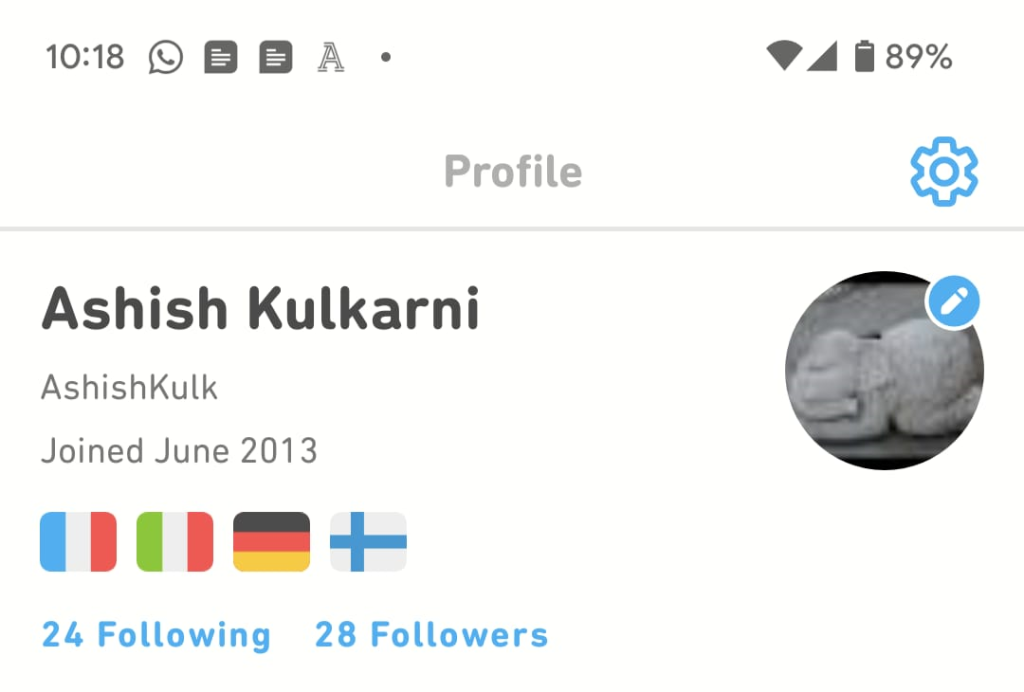I got “promoted” on Duolingo recently, and today’s blogpost is about how weirdly happy I feel about it.
I am an incredibly lazy person. We all are to varying degrees, I suppose, but I’m convinced that I do putting off and procrastrination better than most. There are a few things that I do with enthusiasm and something approaching regularity (writing here being one of them) but with most things in life, tomorrow is a better day for me than today.
There is a very short list of things I am compulsively addicted to doing on a daily basis, There’s Wordle, for example. Reading blogs, for another. The NYT mini crossword, and some other stuff. But there is a clear winner on this list: Duolingo.
On Duolingo I have a 753 day streak, and counting. That is, I have practised on the Duolingo app for 753 days and counting. And it’s not because I am awesome at showing up regularly – it is because Duolingo has incentivized me to show up regularly, and here’s how they do it.
First, peer pressure. Duolingo allows you to follow people in your contact list who are also on Duolingo, and it’s a two way street. That is, they can follow you too:

AshishKulk is my user ID on Duolingo, and please feel free to “add” me to your network if you are so inclined. I can always do with more peer pressure! Knowing that my friends are practising more than I am is a great incentive to try and keep up – which, of course, is what peer pressure is all about.
The score-keeping mechanism in Duolingo is XP. The app tells you how much XP you “acquired” on a daily, weekly, monthly and all-time basis.
Each of these frequencies is gamed differently. For the all time streak, you can check where you rank among your friends (I’m third, if you’re wondering). For the monthly score, Duolingo hands out “badges” if you earn a certain number of XP in a month:

For weekly streaks, you get promoted to different “leagues” based on how many points you score on a weekly basis. It is a double edged sword: you also get “demoted” if you don’t practise enough in a week. The leagues start and finish every Sunday afternoon India time, and I’m typing this out on a Sunday morning – wish me luck!

And the daily basis is perhaps the best gamification of them all, because you end up in a contest with yourself. How long can you keep your daily streak going? Like I said, mine is at 750 odd days, and I got “promoted” for it:

There are also daily quests, friend quests, stories involving characters that build a more personalized, relatable learning experience, and recently, learning paths that use spaced repetition to make sure that weaker concepts are revised and firmed up over time. You can “buy” streak freezes to “protect” your streak in the Duolingo store. These artefacts can be “purchased” using “gems”, and that’s yet another gamificaiton story.
Long story short, the Duolingo team goes out of its way to try and keep you hooked on to learning, and I’m here to tell you that it has definitely worked in my case.
And that’s the point of this post, really. I think Duolingo to be an exemplar when it comes to gamification, but the meta-point here is an obvious one: how do we all go about gamifying activities in our life that we wish would turn into habits? How about a Duolingo experience for exercise? Meditation? Learning cooking? Financial habits?
There are those among us who can build out habits in their lives without gamification, of course, and I envy them for it. But for those of us who are paashas of procrastination, such a tool can help us get better at showing up more regularly.
I speak from personal experience when I say this, though: Duolingo has done it better, and been more effective, than any other habit forming app that I have tried.
Now, excuse me while I go and try to stay in the Diamond League!

One thought on “Duolingo, Gamification and Habit Formation”